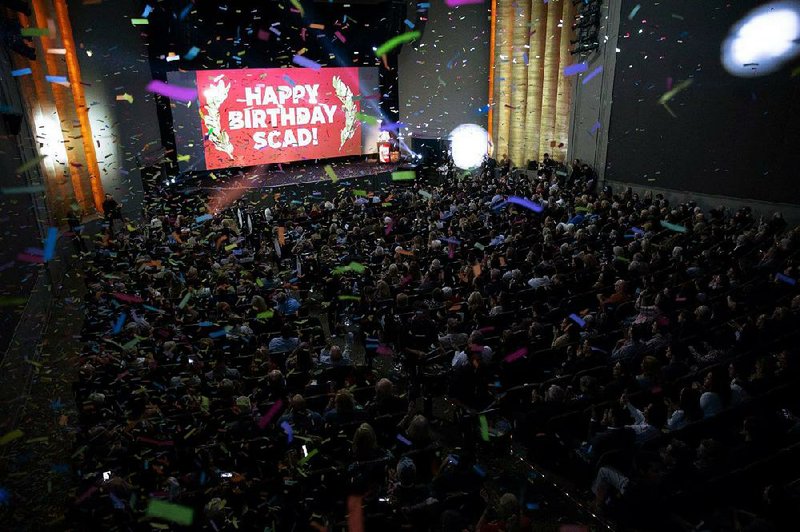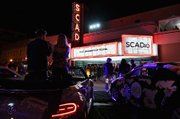SAVANNAH, Ga. -- At the Savannah College of Art and Design, they apparently have a confetti cannon. And a drum corps. And a sophomore named Linc, whose bad dancing is redeemed by his enthusiasm for his school. The adjective for him -- a description to which I doubt he would object -- is "adorable."
While adorable is not the adjective Savannah would choose for itself, you could make it fit. After all, this is where Forrest Gump handed out chocolates. The picturesque old squares are beautiful yet, as Paul Greenberg once perceptively noticed, decidedly less "birthday cake" than Charleston, S.C.
On the other hand, some of my relatives who live nearby -- I was born here -- tell me it is dangerous and that they will not come downtown at night. But we hear the same about Little Rock and, if anything, downtown Savannah feels less gritty than home.
There is plenty of free time during the festival between screenings, so Karen and I walk from Martin Luther King Jr. on the west to Broad Street on the east, from the northern riverfront into Forsythe Park in the south, and while I think if we went a little farther east or west we might encounter a different sort of city, the general impression is of a New Orleans on its best behavior (which mightn't be the best or most authentic New Orleans).
Which means there's music in the cafes at night, but the only real revolution is one of style -- you don't loose 10,000 flaming liberal-arts types on a susceptible repository of history and ghosts without stirring up the Spanish moss, but Savannah never forgets its manners.
While the film festival is pretty good, especially for a city that -- by the numbers anyway -- is about half the size of Little Rock, it should be acknowledged that it also feels as much like a civic enterprise as an artistic mission. It is small in the number of films it programs, but ambitious in the names it means to attract.
Today we saw power couple John Krasinski and Emily Blunt, along with Maggie Gyllenhaal -- all here to accept awards, make brief remarks and spend a few hours with the college students. Which is all well and good, although the movies they're bringing with them, A Quiet Place and The Kindergarten Teacher, respectively, aren't exactly tough gets for moviegoers.
A Quiet Place is one of 2018's signal Hollywood movies, but you've been able to see it on home video for weeks. And The Kindergarten Teacher is streaming on Netflix.
Still, I get it; the big-face stars add glamour and draw crowds. Which allows the festival to show an opening night film like Alfonso Cuaron's remarkable memory play Roma. And even if the kids who squeezed past our aisle seats left before the feature started -- after Krasinski and Blunt had made their brief acceptance speeches and done their best to inspire the talented to follow their dreams -- most of the crowd didn't slip out.
Which is the way we have to play it -- you can't just strap someone down, pry their eyelids apart and force them to watch The Rules of the Game or Mala Noche. Maybe you lure them in with the third guy from The Office and Anne Hathaway's friend from The Devil Wears Prada who have recently become genuine movie stars and they end up staying for the Mexican director's black-and-white valentine to his childhood. (Right now, Roma would have to be the favorite to win the next best foreign language Oscar, but that mightn't have been apparent when the festival booked it. Maybe all they knew about the film was Cuaron's reputation as one of the world's best and most meticulous filmmakers.)
As with every film festival, Savannah has to balance accessible audience-drawing films with more challenging fare. And as the largest film festival connected to a university, Savannah has an additional mission of serving the college's students. One of the best things a film festival can do is provide aspiring artists with models -- people who dream of making movies benefit from being around people who are making movies because it allows them to see that films aren't made by geniuses but by skilled craftsmen collaborating with other earnest professionals. It may not be easy, it might even be daunting, but it's not impossible.
So sure, there is probably a component of the Savannah Film Festival audience that wants to associate with the glamour of movie stars like Armie Hammer (also here), go to the parties and maybe watch a screening of Isle of Dogs -- also here, as is its director, Wes Anderson, and a few of the stop-action animation movie's miniature sets (although the sets were hard to find, having been moved at the last moment). There are others looking to make meaningful connections to possible future collaborators. And there are people who just like movies.
It's not all great -- we caught one short film that, while its heart was in the right place, was exactly the sort of well-meaning public relations piece that probably wouldn't make the cut at, say, the Hot Springs Documentary Film Festival. On the other hand, two of the shorts we saw here and probably would not have encountered anywhere else -- Holy Moses by Eli Powers, a writer-director and former assistant to Amanda Seyfried (a credit he earned as recently as this year's First Reformed), and A.M. Lukas' One Cambodian Family Please for My Pleasure are among the best short films I've seen all year.
Both offer a little window into the way things really work: Seyfried and her husband, Thomas Sadowski, took prominent roles in Holy Moses, probably as a favor to Powers. (Seyfried is listed as the 14-minute film's executive producer.) Another actor in the film, Philip Ettinger, worked with Seyfried on First Reformed.
And writer/director Lukas' film stars Emily Mortimer (who, coincidentally worked with Sadowski on the HBO series The Newsroom) as Hanka, a Czech refugee living in Fargo, N.D. The film consists of Hanka's voice-over of a letter she's writing to the Lutheran Church offering her family's assistance to a Cambodian family fleeing genocide by the Khmer Rouge in 1982.
Lukas -- who was then a working actor/director using the name Anna Martemucci -- raised the bulk of the money needed to finish the film by winning the inaugural grant from Tribeca Film Festival's "Through Her Lens" program designed to encourage female filmmakers in 2015. She was awarded $75,000 and production support from Pulse Films and Tribeca Digital Studios. (The film, based on a true story, was released on the cable network TNT as part of its Shatterbox series earlier this year.)
Which demonstrates there are at least a couple of ways to make your movie. Maybe you've got some friends who are willing to help out. Maybe you can win a competition.
Or, as some of the Savannah students seem determined to do, maybe you can find your own way.
Email:
pmartin@arkansasonline.com
www.blooddirtangels.com
MovieStyle on 11/02/2018

